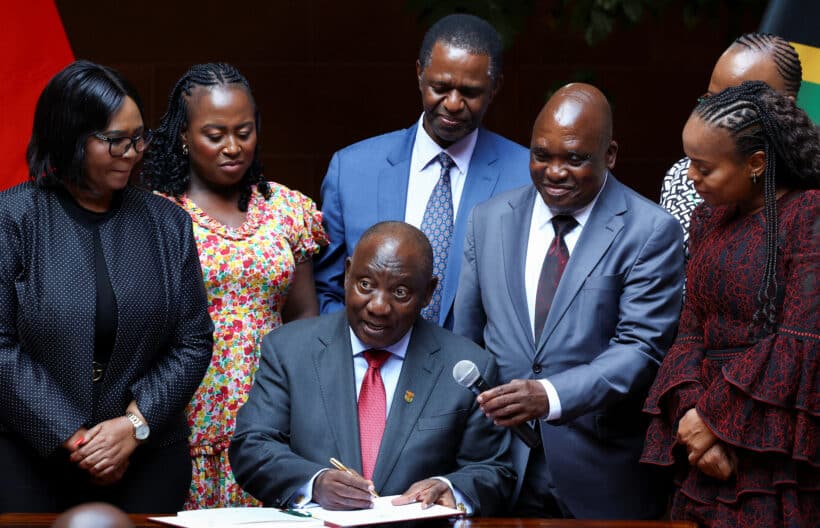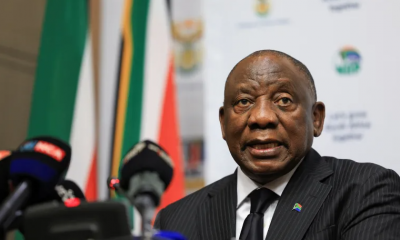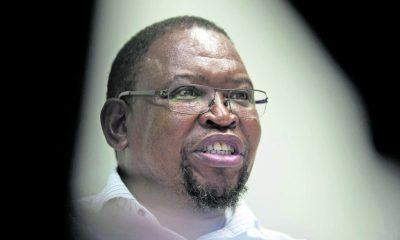411
Three Laws Ramaphosa Signed That Sparked Controversy in South Africa

President Cyril Ramaphosa signed multiple laws in 2024 and early 2025, but three stand out due to the havoc they caused in South Africa. The Basic Education Laws Amendment (BELA) Act, the Expropriation Act, and the National Health Insurance (NHI) Act have sparked heated debates, raising concerns over education policy, property rights, and healthcare reform.
While other legislative changes, such as the Electricity Regulation Amendment Act and the National Nuclear Regulator Amendment Bill, have been met with less opposition, these three laws continue to fuel public debate. Here’s why they are so controversial.
BELA Act: Controversy Over School Governance and Language Policy
On 13 September 2024, President Ramaphosa signed the Basic Education Laws Amendment (BELA) Act into law. This act amends the South African Schools Act of 1996 and the Employment of Educators Act of 1998.
Key Concerns:
- The BELA Act centralizes decision-making power in the Department of Basic Education, reducing the authority of school governing bodies.
- Critics, including political scientist Dr. Frans Cronje, argue that parental involvement is essential for school success, and this law diminishes that role.
- Language policy remains a contentious issue, particularly for Afrikaans-speaking communities, as the law may reduce language-based admissions policies in schools.
While the government argues that the law aims to transform education and address administrative challenges, opponents fear it will reduce accountability and weaken educational standards.
Expropriation Act: Threat to Property Rights and Investment?
Signed into law in early 2025, the Expropriation Act establishes a framework for the government to seize land and other property in the public interest.
Key Concerns:
- The law allows expropriation at below-market value, raising fears that property rights are being undermined.
- Investors worry that the uncertainty surrounding compensation will deter foreign and domestic investment, stalling economic growth.
- The act may also strain diplomatic relations, particularly with the United States, which has expressed concerns over South Africa’s commitment to protecting property rights.
Critics argue that weakening property rights could lead to a decline in investor confidence, making it harder for South Africa to achieve sustainable economic growth.
National Health Insurance (NHI) Act: An Unfunded Promise?
The NHI Act, signed in May 2024, aims to provide universal healthcare by consolidating public and private funding into a single pool. However, concerns about its feasibility and funding remain unresolved.
Key Concerns:
- The government has not provided clear funding mechanisms, raising doubts about how the system will function.
- Economist Dawie Roodt warns that additional tax burdens could drive high-income earners and businesses out of the country.
- Healthcare governance expert Alex van den Heever argues that while universal healthcare is necessary, the current NHI model is impractical and could create more problems than it solves.
The debate over NHI continues, with critics calling for more realistic reforms to improve healthcare access without jeopardizing the economy.
The Bigger Picture: South Africa’s Legislative Landscape
While these three laws have faced significant backlash, other legislative changes are also shaping South Africa’s future. The Electricity Regulation Amendment Act seeks to open the energy market to competition, and the National Nuclear Regulator Amendment Bill strengthens nuclear safety measures.
However, many bills are still pending. The Parliamentary Monitoring Group reports that 16 bills await Ramaphosa’s approval, including several finance-related laws essential for the country’s economic policy.
The BELA Act, Expropriation Act, and NHI Act have emerged as some of the most polarizing laws signed by President Ramaphosa in 2024. Critics argue they threaten education governance, property rights, and economic stability, while the government defends them as necessary steps toward transformation.
With growing opposition from political analysts, economists, and business leaders, these laws will likely remain central to South Africa’s policy debates in the coming years.
Follow Joburg ETC on Facebook, Twitter , TikTok and Instagram
For more News in Johannesburg, visit joburgetc.com



























